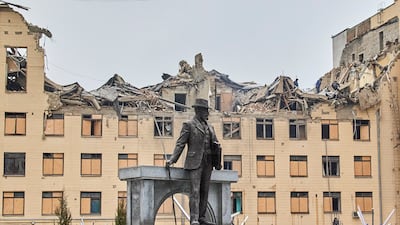Ukraine has secured the backing of the International Monetary Fund's staff for a $15.6 billion loan programme.
The team and the war-torn country reached a staff-level agreement on a four-year comprehensive loan programme, the Washington-based lender said on Tuesday.
The agreement aims to help Ukraine's government to restore financial stability and support its gradual economic recovery, while promoting long-term growth in its post-war reconstruction phase and path to EU membership.
“The staff-level agreement reflects the IMF’s continued commitment to support Ukraine and is expected to help mobilise large-scale concessional financing from Ukraine’s international donors and partners over the duration of the programme,” said Gavin Gray, who led the fund's team that held discussions with Ukrainian officials in Warsaw from March 8 to March 15.
The agreement is subject to approval of the fund's executive board, which is expected in the coming weeks, the IMF said.
“In addition to the horrific humanitarian toll, Russia’s invasion of Ukraine continues to have a devastating impact on the economy … a large share of the capital stock has been destroyed, and poverty levels have climbed,” Mr Gray said.
“Acute macroeconomic challenges persist due to the scale of the shock and the expansion of the fiscal deficit.”
Ukraine's economy shrank by 30 per cent last year and the fluidity of the conflict means an uncertain economic outlook, amid a range of outcomes that range from a 3 per cent contraction to a 1 per cent expansion in real gross domestic product growth for 2023, the fund said.
Damage to the country's infrastructure was estimated at $138 billion as of December 2022, equal to 70 per cent of gross domestic product in 2021, according to the Kyiv School of Economics.
Last month, Moody's Investors Service downgraded Ukraine's rating deeper into junk, or non-investment grade, territory as a result of the mounting pressure on its finances.
Moody's forecasts financing needs of about 20 per cent of GDP in 2023, which are expected to be mainly covered through donor support and the remaining by issuances on the domestic market.
Despite the challenges Ukrainian authorities have managed to maintain a degree of macroeconomic and financial stability, thanks to external support and skilful policymaking, Mr Gray said.
“A gradual economic recovery is expected over the coming quarters, as activity recovers from the severe damage to critical infrastructure, although headwinds persist, including the risk of further escalation in the conflict,” he said.
The IMF programme will be divided into two phases.
Under the first stage, which runs from a year to 18 months, Ukraine will take measures to “strengthen fiscal, external, price and financial stability”.
The measures are intended to improve its revenue collection and eliminate monetary financing.
The second phase would shift to more expansive reforms to boost macroeconomic stability, support the country’s recovery and reconstruction, as well as “enhance resilience and higher long-term growth” in the context of Ukraine’s EU accession goals.
Ukraine would be expected to “revert to pre-war policy frameworks” during the second phase, which include a flexible exchange rate and measures to bring down inflation to a set target, the IMF said.
Government fiscal policies would focus on critical structural reforms to anchor medium-term revenue through the carrying out of a national revenue strategy as it shores up its management of finances and introduces public investment reforms to support post-war reconstruction, the fund said.
Enhancing competition in the country's energy sector and reducing fiscal liabilities will complement post-war reform efforts, the IMF said.














